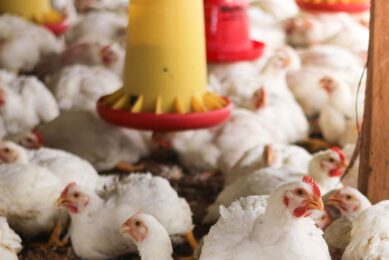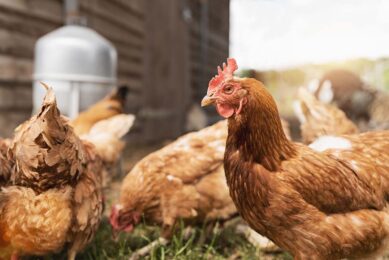Improving eggshell quality
![Maintaining the highest percentage of first grade eggs, even during heat stress, is essential for commercially viable egg production. [Photo: Koos Groenewold]](https://www.poultryworld.net/app/uploads/2021/04/001_60_rb-image-2692585-848x565.jpeg)
Heat stress in layers has a severe negative impact on eggshell quality. The addition of certain supplements to the bird’s diet could alleviate the effect of heat stress on acid-base imbalance, plasma Ca ?concentration, egg production and egg quality in commercial layers.
Eggshell quality is of major importance to the egg industry and also has a major economic impact on commercial egg production. Broken and cracked eggs represent an economic loss to egg producers. Some 6-8% of all eggs produced commercially are unusable because of poor shell quality. Numerous factors involved in eggshell quality include nutrition, age, stress and disease. But the most important factor which should be managed for the bird’s health and to maintain good eggshell quality is heat stress.
Effect of heat stress
The extent of heat stress will be influenced by factors such as humidity and the extent to which the birds have become acclimatised. The deleterious effects of heat stress on eggshell quality appear to be due to several reasons. Both heat exposure and reduced appetite affect the laying performance and eggshell quality of birds exposed to high ambient temperatures. Whereas egg production and egg weight are influenced to a major extent by the reduction in feed consumption, eggshell quality is influenced primarily by high temperature.
- Heat stress in birds causes many biochemical and physiological changes, such as shifts in acid-base balance, hyperthermia, increased oxygen consumption and the release of carbon di-oxide, increased production of free radicals and corticosterone.
- Depressed feed intake results in decreased calcium consumption.
- At high temperatures, birds pant to enhance evaporative cooling. Panting results in respiratory alkalosis, which is caused by loss of carbon dioxide from the blood and involves an increase in blood pH. This, in turn, decreases the proportion of the blood calcium that is in the ionised form and reduces the amount of calcium available for eggshell formation.
- The activity of carbonic anhydrase (the enzyme which produces bicarbonate for shell formation) is also reduced during heat stress and blood flow to the uterus is also decreased.
- Under high temperature, blood flow within the body is changed and more blood flows to peripheral tissues to transfer more heat from the body core to the surface. The decreased concentration of plasma calcium and the partial pressure of carbon dioxide is attributable to respiratory alkalosis.
- Reduction in shell weight.
- Low shell thickness.
- High eggshell reflectivity. The light coloured shell of the eggs laid during heat stress is due to the reduction in pigment deposited in the cuticle.
Bicarbonate supplementation
Loss of carbon dioxide is accentuated by the need for blood bicarbonate to buffer the hydrogen ions produced during eggshell formation. A reduced bicarbonate concentration in the lumen of the shell gland adversely affects eggshell quality, leading to the laying of rough-shelled eggs. It is therefore possible that, at high temperatures, hens have a nutritional requirement for bicarbonate in order to improve eggshell quality by supplementing the diet with sodium bicarbonate at the rate of 2-2.5 kilogram (kg) per tonne of feed.
The eggshell formation occurs normally during dark periods, but sodium bicarbonate intake by birds does not happen during dark periods. In order to improve sodium bicarbonate intake, the birds are provided with an extended photo period of 18 to 20 hours. An extended photo period does not affect egg production during heat-stressed conditions. Continuous lighting allows hens to consume the dietary supplements during the period of active eggshell formation. If sodium is increased by supplementation with sodium bicarbonate, then, to balance the higher level of sodium, ammonium chloride is supplemented along with the sodium bicarbonate at the ratio of (40:60).
Zinc supplementation
Carbonic anhydrase is reduced during high temperatures. Carbonic anhydrase is required to form bicarbonate that passes through the shell gland to form calcium carbonate. So zinc supplementation in the form of zinc methionine or zinc propionate increases the carbonic anhydrase activity that alleviates the effect of heat stress and maintains better eggshell quality.
Potassium Chloride supplementation
Water is an essential nutrient which facilitates the transfer of the minerals (Na+, K+, Cl-). The water intake during summer increases to three times the feed intake. The water circulation in the body system reduces body heat. In cases of heat stressed birds, the water intake becomes suppressed. So, along with the water, potassium chloride mixes at the rate of 0.5-0.6%, improves the water intake by 90%, increases evaporative heat loss by 80% and increases apparent respiratory efficiency by 25%.
Chromium and Manganese supplementation
Heat stress effects are counteracted by chromium (Cr) and manganese (Mn) supplementation in feed. The addition of 20 milligrams (mg) of Cr/kg and 120 mg of Mn/kg of diet alters eggshell thickness.
Ascorbic acid supplementation
Ascorbic acid is a natural supplement available to alleviate heat stress in layers during hot weather. Adding 5 millilitres of lemon juice per litre of drinking water will reduce eggs with broken and fragile shells. The useful effect of lemon juice on the eggshell quality of heat-stressed birds could be due to ingredients such as the ascorbic acid in lemon juice.
Although poultry can synthesise vitamin-C, its quantity becomes insufficient during heat stress as a result of its increased rate of usage to combat the free radicals generated. Vitamin C supplementation at 500 parts per million (ppm) is beneficial to maintaining bird performance, including interior and exterior egg quality under severe environmental stresses. The decline in eggshell quality is affected not only by the decreased intake of calcium and phosphorus, but also by the depletion of the ascorbic acid required for the conversion of 25-hydroxycholecalciferol-r into the one 25-dihydroxycholecalciferol produced in the kidneys, which is essential for regulating calcium metabolism and eggshell calcification.
Vitamin-E supplementation
In a normal bird, there is sufficient antioxidant capacity to remove active oxygen; but when exposed to environmental stress, this may be depressed. Through its intra-membrane antioxidant properties, vitamin E may protect tissue membranes from the lipid peroxidation caused by free radical attacks and it alleviates the effects of environmental stress in laying hens. Supplementation of vitamin C at 200 mg/kg and vitamin E at 250 mg/kg in the diet can ameliorate the detrimental effects of heat stress and improve the egg quality parameters of egg weight, eggshell weight, albumen and yolk weight.
Cost-effective measures
Measures to alleviate the effects of heat stress by adding supplements to the bird’s diet could alleviate the effect of heat stress on acid-base imbalance, plasma Ca concentration, egg production and egg quality in commercial layers. These are the cost-effective ways of combating heat stress without creating additional stress in birds. Egg breakage will be reduced and fertility and hatchability will be improved in parent flock.
References available upon request
Join 31,000+ subscribers
Subscribe to our newsletter to stay updated about all the need-to-know content in the poultry sector, three times a week. Beheer
Beheer








 WP Admin
WP Admin  Bewerk bericht
Bewerk bericht